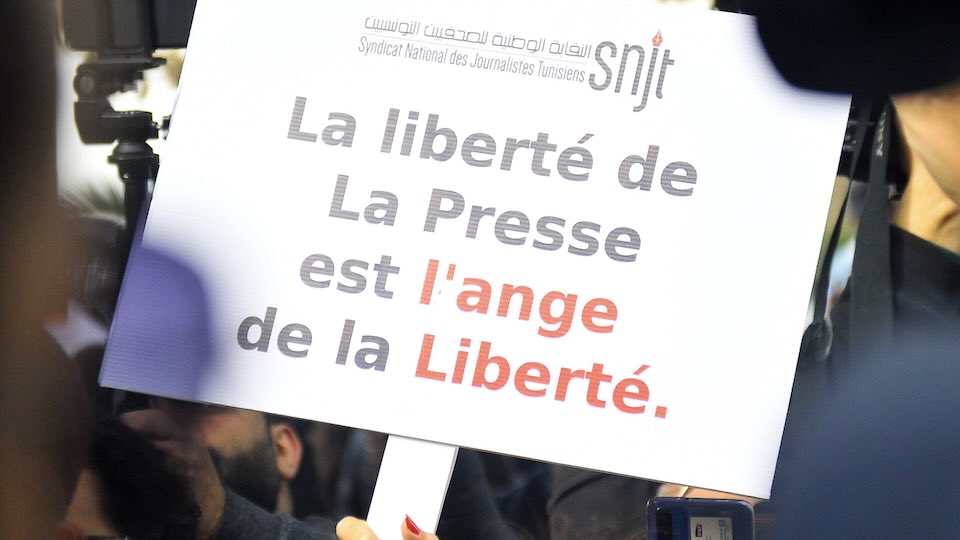Tunisia: Authorities use cybercrime decree to prosecute journalists

The government in Tunisia is stepping up its efforts to prosecute journalists. Many have been arrested for allegedly violating a law aimed at fighting cybercrime, the Committee to Protect Journalists (CPJ) reported last week. According to the CPJ, as of December 1, 2024, at least five journalists were imprisoned in the North African country – the highest number since the group began keeping track in 1992.
Four journalists currently in prison in Tunisia were sentenced for alleged violations of the controversial Decree 54, the CPJ reports. Comments the journalists had made on television or radio and posts they had made on social media formed the basis for the charges.
Members of the press in Tunisia argue that the government applies the decree in a targeted way to suppress investigative journalism and journalism critical of the authorities. Many have started practicing self-censorship out of fear of prosecution.
Ziad Debbar of the National Syndicate of Tunisian Journalists (SNJT), a trade union, told the CPJ: “Decree 54 has now turned every journalist into a suspect.” Members of the press, he said, “can be summoned for questioning at any time over anything they post online.”
Lofti Hajji, also of the SNJT, told CPJ that the decree “has been excessively applied to journalists, bloggers and political commentators in the media.” Hajji continued: “This has led to a huge decline in political television and radio programs that once in abundance offered in-depth analysis of current political issues.” Journalists were also hesitant to report about the decree itself, he said, for fear of prosecution.
Five years in prison for allegedly spreading fake news
Decree-Law no. 2022-54 on Combating Crimes Related to Information and Communication Systems makes it a crime to disseminate false news, with those convicted under the decree facing up to five years in prison and a fine. President Kais Saied issued the decree in 2022; critics say Saied has grown increasingly authoritarian since assuming power in 2019.
According to the CPJ, Tunisian authorities stepped up their harassment of journalists in the lead up to elections last October, arresting and charging prominent members of the press. Lawyer Sonia Dahmani, who also works as a political commentator, was sentenced to a year in prison for allegedly spreading fake news. The sentence was later reduced to eight months – but as the CPJ reports, Dahmani was tried again under the decree and sentenced to an additional two years.
Dahmani had appeared on a popular program aired by the private radio station IFM. The program’s moderators, Mourad Zghidi and Borhen Bsaies, were arrested the same day as Dahmani. As Amnesty International reported last year, citing the police report, officers questioned Zghidi about social media posts in which he had criticized President Saied – including a Facebook post he had written expressing support for a jailed investigative journalist. Zghidi’s interrogators also asked about critical comments he had made on his television and radio programs.
The CPJ reports that Zghidi and Bsaies were each sentenced to a year in prison for allegedly violating Decree 54. The journalists also face additional charges.
Journalists in Tunisia were once protected by a press law, Decree 115. But as the CPJ reports, the decree is no longer enforced, and the freedom of expression enshrined in Tunisia’s constitution is no longer respected. The country’s media regulator has also been forced to suspend activities.
Criticism of decree
Several rights groups sharply criticized Decree 54 when it was first issued in 2022 – and warned of increasing limits on press freedoms. Among the criticisms was that the law fails to define what counts as a rumor or as fake news. The groups feared that the terms could be applied broadly by the authorities as a way of prosecuting journalists, human rights advocates and opposition politicians.
Human Rights Watch (HRW) noted in 2023 that since it had gone into force, the decree had been used to intimidate critics. HRW reported on the first sentences handed down under the decree.
For years observers have warned that the democratic achievements of the past few years in Tunisia are increasingly in peril and that the country risks lapsing back into authoritarianism. In July 2022, a controversial new constitution was passed by referendum that places nearly all power in the hands of the president – granting him, for instance, the authority to appoint and fire judges and ministers. According to official statistics, turnout for the referendum was only about 30 percent – with the political opposition calling for voters to boycott the referendum.
According to the German Foreign Office, in October 2024 the government also began monitoring social networks more closely for “immoral content.” The heightened scrutiny is focused especially on Instagram and TikTok.
Last week, HRW reported that the Tunisian government had intensified its crackdown on critical voices in the country, targeting members of civil society groups and of the media who have spoken out against the president’s policies. As of November of last year, more than 80 people “were detained on political grounds or for exercising their rights.” Those detained include political opponents, lawyers, journalists, and human rights advocates – as well as ordinary social media users.
According to Reporters without Borders (RSF), following the revolution in 2011 a diverse media landscape emerged in Tunisia – but the climate in the country has significantly worsened since the election in 2019. Tunisia is ranked 118 of 180 countries on the RSF’s World Press Freedom Index. (js)